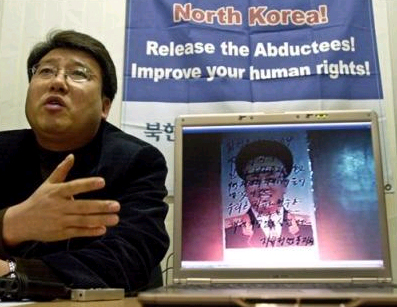
"Nerds that are wont to blog make music with computers." That's one of Newton's, I think.
Baghdad blogger Ali looks to his people's first legally imperative election by briefly glancing behind him:
The stakes are too high for [terrorsts] just as they are for us. We've been waiting for the moment when we can decide our future all our lives and now it's happening and I can't tell you how excited that makes me and all freedom loving Iraqis. I feel like after voting I would not care what would happen to me. I would say my word, voice my will loud and clear in public for the first time in my life and that means almost everything to me. The terrorist can kill me and many of the Iraqis who are going to vote, but we would die proud. We will regain our self esteem and our pride that Saddam and his thugs took away by humiliating us, torturing and killing our friends and beloved ones infront of our eyes and then spitting in our faces after that, and all we could do was what we had to do to avoid more death and torture, we could only praise them after each murder and each crime. It made us hate ourselves and the whole world, lose our trust in everyone and just keep living a life that was worse than death but one that we still couldn't sacrifice for a good cause fearing for our families fate after our death.
We're told hell operates the same way. This election will be the first of many, and it will be one day after the last day of an Iraq never having known government by consent of the people. The nightmare is nearly over.
It would be mundanity if it weren't 900 million miles away:
An international team of scientists continue[s] to work hard on analysis of data sent back from Titan by the European Space Agency's Huygens probe. The team now believes the probe landed in mud.
Titanian mud. Science fiction — but it's real.
He speaks the truth:
[Zimbabwaen dictator] Robert Mugabe hailed Iran as a "critical partner" and vowed to take cooperation to "new heights" as he played host to President Mohammad Khatami, the state-run newspaper reported.
Is Agent France-Presse sure Mugabe didn't say "criminal partner"? Either way, the flattery is fitting.
Meanwhile, Iranian patriots fight and die for the simple rights of civilized men.
The Weekly Standard knows what to do with bloggers: put them to good use, doing what they do best.
The ranks of men and women sworn to defend a democratic Iraq continue to grow. The regular Iraqi Army gained over 1,700 graduates, one class destined to serve in the 5th Division and the other — including a small group of medical specialists — in the 8th Brigade. The Army's counterinsurgency arm, the Iraqi Intervention Force or IIF, gained nearly 700 graduates. As a testament to Iraq's self-reliance, most recently seen in the scaling-down of a NATO training deployment, the Iraqi Navy opened the doors of a Non-Commissioned Officer school in the southern port city of Umm Qasr.
Iraq's defenders found another edge on their authoritarian enemies with two materiel gifts from the United States: a trio of C-130s and a pair of light reconnaissance aircraft.
Meanwhile, Chester was so inspired by a soldier's plea for honest reporting that he hopes to begin a series of firsthand military accounts, along the lines of Frank J.'s now-defunct Front Line Voices. Here's to success.
Just a few weeks after prevailing wisdom classified strange goings-on north of the 38th Parallel as perfectly normal, preparing them for quiet dismissal from public conjecture, the question of Korean determination is again a serious one:
A human rights (search) group claimed Tuesday that it has obtained video footage showing dissident activities in North Korea, with demands for freedom and democracy written over a poster of North Korea's leader, Kim Jong Il. If authentic, it would be the first time images of dissent in the highly secretive North have come to light. But there was no way to independently confirm the validity of the footage.The 35-minute videotape, a copy of which was obtained by The Associated Press, shows written statements posted on a wall, urging North Koreans to fight to retrieve freedom and democracy. ...The tape was delivered to the Seoul-based Citizen's Coalition for Human Rights of Abductees and North Korean Refugees, and became public after the Coalition handed over the footage to an Internet news site that specializes on North Korean affairs. The Coalition said the footage was taken by the Youth Solidarity for Freedom at a North Korean town near the border with China.
North Korea was dubbed part of the Axis of Evil by President Bush, so it's natural for supporters to ask if pro-democratic demonstrations, if authentic, have been inspired by the president's matching tough knocks for Pyongyang and good words for a self-determination all men deserve. It's also unfortunately natural for opponents to ask if unscheduled events in the DPRK have absolutely nothing to do with good intentions in Washington or an allied free capital. Protests could very well be organized by no more than small, local groups who can slip materially insignificant items across borders; North Korea is sealed from the outside world tighter than a coffin.
But before cynics laugh at the American vanity they see, they should at least grant that admonishing and ostracizing incontrovertible enemies is more productive than clinking glasses with them. Then they ought to look more closely at the finer points of President Bush's exhortations: he's careful to call freedom "Almighty God's gift to every man and woman in this world," which is another way of saying the American people would never expect to teach a people to want freedom. Instead, with the same incredible resources used to depose dictators and relieve the diaster-stricken, Americans will help give to others that which they already wanted. The more likely that appears from behind barbed wire, the more likely the needy will speak up in a place where one is advised that if they can't say anything sanctioned, they shouldn't say anything at all.
Americans may lead but, fortunately, are not alone. Righteous indignation is found in many languages.

Like a faithful libertarian might, Glenn Reynolds eschews a rigid hierarchy and despite his prominence, extols the blogosphere as an idea, something more than its current practical reality:
I do, however, disagree with [Jim] Miller that any single blog — and certainly not this one — is a sufficient source of diversity.
While the expansion of blogging has brought with it some meritocracy, the blogosphere's relationship with establishment media like journalism and punditry is channeled through a small number of weblogs whose links shape the political conversation — or at least direct the levels of attention paid to specific bloggers and topics. The blogosphere itself is anchored by the top two hundred weblogs, nearly all of them political.
That is made so more by physical realities of the thing than politics. While Glenn is loath to accept any coronation, a media remark from way back — declaring him the "Grand Central Station" of blogging — is apt in that he uses Instapundit like a hub, accepting large volumes of reader e-mail and welcoming that influence in his choice of links ("stringers," as he once called some of them). He even asks readers to, in that regard, "bother [him]." Few bloggers do that, even fewer do it well, and only a handful satisfy the first two prerequisites with a readership of more than a few hundred a day. We know a market: if someone can provide a service better than others, they lead, and that reign is fortified in measures of trust by longevity and recognition. Having helped define the market is an even greater exponent. That kind of esteem is difficult to overcome if it's maintained; case in point, Glenn's links to the weekly "Carnival of the Vanities" weblog tradeshow may only partially succeed as readers still turn to Instapundit as a lodestone for the new weblogs they've discovered.
People are reading blogs — indeed, all kinds on every topic imaginable. But diversity is one thing; pertinence and value are another. Strained for time, energy and attention, people who value efficiency will go for the latter two qualities. At the same time, the blogosphere's introduction to the other nine-tenths of America may be blunted or diverted by some media agencies' selection of weblogs to publicize and bloggers to interview. If the weblogs and their authors on television or in the newspaper are already tied to the mainstream, the essence of blogging — amateur commentary with national reach — remains hidden.
Whether the blogosphere's accidental leaders like that or not may be beside the point. Any emergent institution needs pioneers, especially crossovers from the establishment, to be noticed by a larger audience. To invoke Linux: those who prefer strong decentralization should be prepared to accept disorganization, obscurity or, worse, irrelevance. But encouragingly, we can invoke Amazon, too: at the same time the online retailer dominates the market, its distinction and success has refined the concept and practice of the internet as merchant's row. What thousands of smaller online businesses lack in prestige is more than satisfied with profit by means unthinkable just ten years ago.
BEZOS: Asparagirl has more regarding Amazon and the slow but steady rise of the internet as a pillar of commerce and communication. (Via IP.)
Three days ago I had a hunch Allied forces in Mosul were preparing to knock off terrorist barnacles that had adhered to the city after successful Allied operations in Fallujah. It appears a small, focused offensive is now underway. An Associated Press piece reports the news but the article is so obfuscatory, so full of assertions and unrelated information, that it's worth nobody's time. I'll reference informative publications as they become available.

Photographs from the other side of the solar system not enough for you? Titan, as you may know, has an atmosphere that's slightly denser than Earth's. Sound travels in air.
Following? It just so happens the Huygens lander took along a tape recorder.

